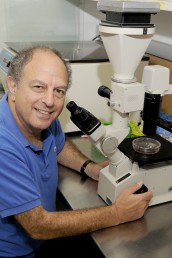Do prostate cancer cells have an Achilles’ heel?
Researchers at the University of Illinois at Chicago describe new ways to selectively kill prostate cancer cells by exploiting the cells’ revved-up metabolism. They report their findings in the online journal, eLife.
In prostate cancer, the loss of a tumor suppressor gene called PTEN is very common. Without a functional copy of this gene, cancer is much more likely to develop. One of the downstream effects of the loss of PTEN is increased activation of an enzyme called protein kinase B, also known as Akt. Akt has multiple roles in the cell, including driving metabolism and cell proliferation — both of which are amped up in cancer cells, contributing to their out-of-control growth and spread. Hyperactivation of Akt can also make cancer cells resistant to chemotherapy, but efforts to develop drugs to suppress Akt in cancer cells have fallen short due to toxicity.
The activation of Akt also produces elevated levels of reactive oxygen species, or ROS. These are byproducts of metabolism that can cause damage to cellular structures, including DNA.
Nissim Hay, professor of biochemistry and molecular genetics in the UIC College of Medicine, believes that these elevated ROS levels can be exploited to kill cancer cells.
“ROS levels are high in cancer cells, which normally helps them grow and proliferate,” said Hay, who is a corresponding author on the paper together with UIC research assistant professor of biochemistry and molecular genetics Veronique Nogueira. “But, we have shown that by pushing ROS levels up above a certain threshold, they become toxic, and we can selectively kill off the cancer cells while leaving normal cells unharmed.”
To boost ROS levels in cancer cells, Hay and colleagues suppressed ROS scavengers using a natural compound found in cruciferous vegetables, such as broccoli and cauliflower, called phenylethyl isothiocyanate, or PEITC.
In a mouse model of PTEN-deficient prostate cancer, PEITC, combined with a drug called rapamycin, almost completely eradicate tumors. Treated mice also showed no recurrence of cancer six months after the treatment stopped.
Next, the researchers targeted another downstream metabolic consequence of Akt hyperactivation: an enzyme called hexokinase 2, or HK2. They found that when they deleted the gene for HK2 in the mouse model of prostate cancer, the cancers in those mice stopped growing. The researchers saw similar results in human prostate cancer cells, where the deactivation of HK2 helped restore prostate cancer cell sensitivity to chemotherapy.
“The increased metabolism of cancer cells presents a sort of Achilles’ heel that we have several ways to exploit in order to very selectively kill these cells while normal cells are left alone,” Hay said. More research is needed to determine how best to develop these findings into treatments, Hay explained.
Krushna Patra is a co-author on the paper.
This research was supported by grants R01 AG016927, R01 CA090764, R01 CA206167 from the National Institutes of Health and grant BX 000733 from the U.S. Department of Veterans Affairs.

